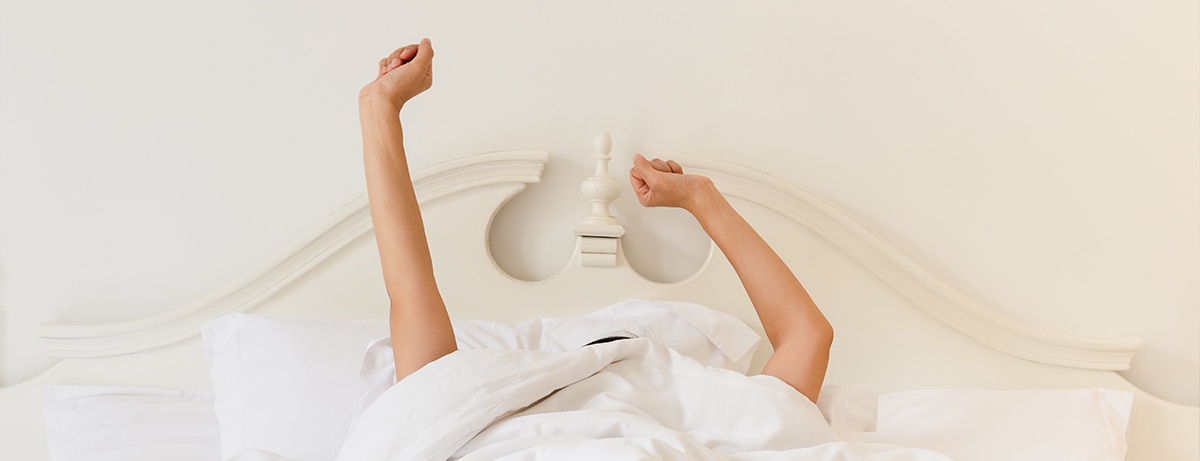15% off £35 OR 20% off £45
Code:FAVES
Menopause & sleep: Top tips

Find out sleep expert Stephanie Romiszewski's top sleep tips for those experiencing the menopause, including how to boost your sleep quality and duration.
Summary
1Follow a regular sleep pattern
Our bodies need a ‘re-set’ time every day to understand when to release hormones to regulate your appetite/sleep cycle/temperature and mood...
2Take some time out for you
Focus on a good quality day, rather than how you can sleep, often the absence of thoughts on sleep, and the focus on feeling good happy and content...
3Be consistent
Our bodies want to wind up in the morning (light has the power to help with this) and wind down in the evenings (the absence of light helps with...
Peri menopause, menopause, post menopause… the physical changes, the hormonal changes and the psychological effect can create the perfect storm when it comes to sleep.
It seems that the most common, debilitating symptoms are the ones that creep in at night. The night sweats and the insomnia. However, just because these triggers affect us so much, it doesn’t mean there isn’t anything we can do.
It's true that menopause can keep triggering wake ups for various reasons in the middle of the night such as night sweats.
However, very commonly with a fairly chronic trigger, your brain starts to make associations with the night-time and being awake… and in a bid to help you (though we don’t see it that way), it can start learning and habituating to them.
Suddenly, these awakenings aren’t brief or sporadic anymore, they become fairly predictable and instead of just waking and going back to sleep... you can’t get back to sleep for hours and it keeps happening over and over and over… and a pattern has emerged.
The good thing about this is there are things we can do to break this pattern, and at least boost your sleep quality and duration to a point where the triggers are much easier to cope with.
Find more information at our sleep and relaxation hub.

Stephanie's top tips to help you sleep
Read on to find out our sleep expert's top tips to help you sleep better at night.
Follow a regular sleep pattern
Going to bed when you feel very sleepy and waking at the same time each day.
First of all, let me explain this properly – there is no fixed bedtime. How can there be?
The variables are changing so fast in your life this may be slightly different times for a while.
It's best to listen to your body and go to bed when you really really feel like it. Give yourself permission to stay up later and enjoy yourself!

The same is not true of the wake time. Our bodies need a ‘re-set’ time every day to understand when to release hormones to regulate your appetite/sleep cycle/temperature and mood.
These things are key right now.
So actually, enforcing a regular wake time with plenty of light exposure is going to quickly help your body habituate to a regular ‘re-set’ time.
Eventually, if you do both of these things regularly, you will start to notice waking up gets much easier, and you start to feel sleepy around the same times each night.
These timings though, might look different to pre-menopause for you. Try not to have expectations based on pre-menopause.
Your body is going through a lot, and rest and sleep will be important, however forcing it to do things it clearly doesn’t need right now is unhelpful and can make sleep problems worse.
Imagine if you let go of your expectations and rather go on how you feel?
Sometimes comparisons can lead us into all sorts of random behaviours that only tend to increase our anxieties when they don’t work, such as lying in a dark room trying to will sleep to come.
Take some time out for you
Start thinking of additional activities in life that might help you feel better – it’s time to start thinking about you!
That could look like yoga, meditation or ‘you’ time in a different way – it doesn’t matter what you choose as long as it works for you.
Concentrating on how you feel during the day, making sure you have things to look forward to and things that make you feel good will reduce anxiety and stress which exacerbate sleep issues.

Focus on a good quality day, rather than how you can sleep – often the absence of thoughts on sleep, and the focus on feeling good happy and content can actually have great effects on your sleep.
It is possible to have frequent wake-ups at night and not have anxiety. Imagine if you didn’t hold sleep so accountable?
You might start treating the times that you wake up differently, being kinder to yourself and using the extra wake time to enjoy yourself (even if it is the middle of the night!).
Be consistent
Light is also an unusual but influential aid for our mood especially – we have evolved on our planet with its light/dark cycles.
Our bodies want to wind up in the morning (and light has the power to help with this) and wind down in the evenings (the absence of light helps with this).

This wind up/wind-down process affects all sorts of hormones, including your serotonin which is involved in making you feel good, calm, and focused.
So, try and mimic this process with plenty of bright light in the mornings, followed by reducing it down in the evenings.
The likelihood right now is that your mornings are not bright enough, and your evenings are too full of light!
Remember, your body has different needs right now in terms of your circadian rhythms – that’s your sleep-wake cycle, your appetite regulation, and your mood regulation hormones.
The more you can be consistent with your behaviour that influences these processes the most; same wake times, consistent mealtimes, regular relaxation times and bright light during the day followed by low light in the evenings, the easier it is to cope with all the changes.
Summary
It is easy to get overwhelmed with all the quick fixes and treatments out there for menopausal symptoms, but we rarely focus on the key behavioural and most influential things we can do consistently that will have the most impact.
Follow these tips for a good few weeks consistently for positive results.
Takeaway
It would be totally normal during this time to need extra support.
We are only human.
So, despite these tips, always feel free to contact your GP for more generalised menopause support or a qualified sleep expert for sleep support because there are solutions, and you don’t need to suffer alone!

Stephanie Romiszewski: Reset your sleep
Listen to our podcast where in this episode, leading sleep psychologist Stephanie Romiszewski shares:
- Sleep advice that could be making it worse.
- Simple changes we can make to our behaviour to help us sleep better.
- Her top tools for improved sleep
The advice in this article is for information only and should not replace medical care. Please check with your GP or healthcare professional before trying any supplements, treatments or remedies. Food supplements must not be used as a substitute for a varied and balanced diet and a healthy lifestyle.
Related Articles
Shop by wellness goal
Sign up for exclusive offers
Plus, get expert advice to support your health & wellness straight to your inbox when you sign up to Holland & Barrett emails.
Read our
privacy policy














